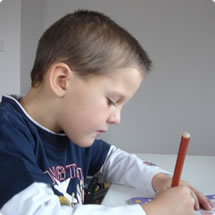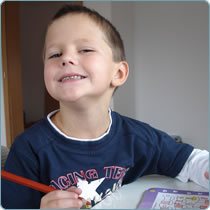Treatment of speech and language disorders


Treatment of speech disorders
Lorem ipsum dolor sit amet, consectetur adipisici elit, sed eiusmod tempor incidunt ut labore et dolore magna aliqua. Ut enim ad minim veniam, quis nostrud exercitation ullamco laboris nisi ut aliquid ex ea commodi consequat. Quis aute iure reprehenderit in voluptate velit esse cillum dolore eu fugiat nulla pariatur.
Treatment of language disorders
Lorem ipsum dolor sit amet, consectetur adipisici elit, sed eiusmod tempor incidunt ut labore et dolore magna aliqua. Ut enim ad minim veniam, quis nostrud exercitation ullamco laboris nisi ut aliquid ex ea commodi consequat. Excepteur sint obcaecat cupiditat non proident, sunt in culpa qui officia deserunt mollit anim id est laborum..
Speech therapy for children and adults
I am a speech therapist with training in the diagnosis and treatment of speech and language disorders. I hold a Master Degree and State Diploma this field, as well as a Certificate of Clinical Competence from the Czech Speech – Languague – Hearing Association.
Speech disorders refer to a a variety of speech, voice and language difficulties.
I work with children who are:
- unable to make speech sounds or cannot make them correctly
- children who stutter
- have fluency or rhythm problems
- have difficulty understanding or putting words together to communicate ideas inapporopriate pitch, harsh voice and speech duality problems.
• Articulation disorders include difficulties producing sounds in syllables or pronouncing words incorrectly to the point that other people can not understant whaat is being said.
● Language disorders can be either receptive, or expressive. Receptive disorders refer to difficulties understanding or processing the language. Expresive disorders include difficulty putting words together, limited vocabulary, or inability to use language in a socially appropriate way.
● Fluency disorders include stuttering, a condition in which the flow of speech is interrupted by abnormal stoppages, repetitions ( st – st- st stuttering ) or prolonging sounds and syllables ( sssssssssssstuttering ).
● Resonance and voice disorders include problems with the pitch, volume, or quality of a child´s voice that distract from what is being said. These type of disorders may also cause pain or discomfort for the child when speaking.
Due to the fact that speech disorders are usually related, for example to phonological, neurogical, psychological, or physical conditions Ie work as a member on a team which includes other healtcare specialist.
An important part of my therapist´s work is the counselling, including support to individulas and families on speech disorders and how to cope with the associated stress. First I review a child´s history, including any medical information. I talk with family members, and if necessary, also with physicians about a significant medical history or condition :
When working with young child, it is important to cooporate with the family. Speech – language therapy uses a variety of therapeutic strategies, including:
● language intervention activities – These exercises involve having a speech – language interaction with a child by playing and talking to him/ her. I use Pictures, Books, Objects, or ongoing events to stimulace and build the language development and skills.
● Oral – motor activities, articulation therapy involve exercises promoting artikculation nad sound production during speech activities.
The therapy involves:
- physically showing a child how to make certain sounds
- demonstrating how a child should move his/ her tongue to produce specific sounds,
- building a child´s therapy programme - techniques to use at home. Parents are an extremely important part of their child´s therapy program. Parents help determine whether their child´s experience in speech – language therapy is a success. Children who complete the programme quickly and with the most longest results are those whose parents have been involved. It is very important that parents help their child use the stimulation activities that a speech therapist suggests at home to ensure continued progress and carry- over of newly learned skills.
Therapy should begin as soon as possible. Children enrolled in therapy early in their development ( at the age of 3 – 4 ) tend to have better outcomes those who begin therapy later. This does not mean that older children cannot make progress in therapy. They make progress at a slower rate because they often have learned pattens that need modifying or changing..

